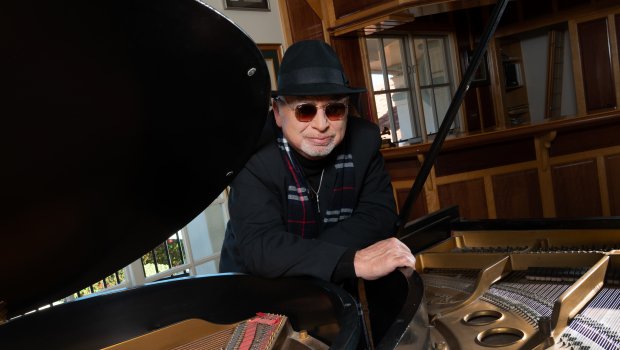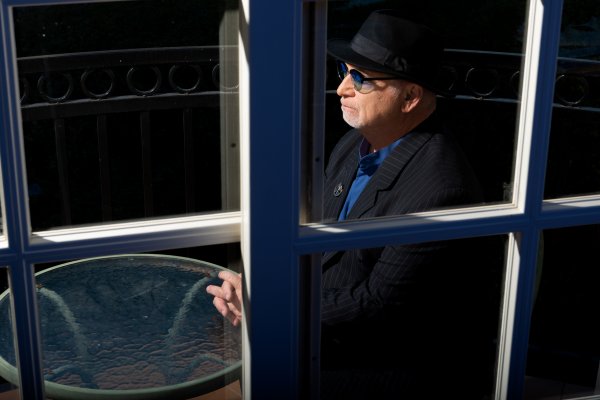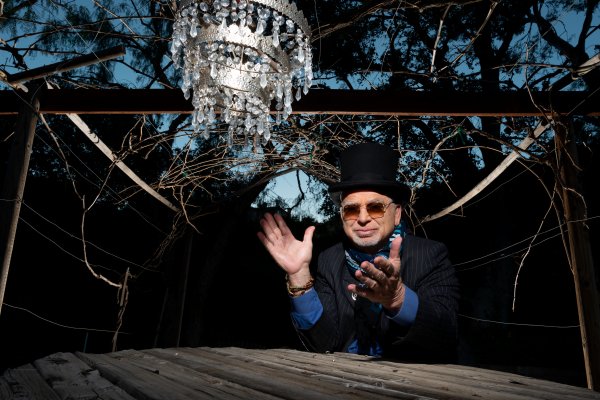With his first solo album just released, Toto legend David Paich spoke to TPA’s Alex Driessen about how less is more and how bands like Yes, Queen and ELP have influenced his band. And much, much more…
It’s not every day that you get to speak to a celebrity of the stature of David Paich, of Toto fame. The man is a living legend, not only because of his work with Toto but also for his career as producer, song-writer, musician and arranger for a list of other artists that would easily qualify as the ‘Who’s Who’ of popular music, including Paul McCartney, Michael Jackson, Steely Dan, Miles Davis, P!INK, Tina Turner, Elton John. However, he has never released a solo album before. Only now, at the respectable age of 68, he has managed to do just that. The album is called Forgotten Toys and I had the honour of interviewing the man via Zoom with some considerable time difference.
Hi David, good evening, or is it afternoon or even morning at your side of the Atlantic? Thank you for allowing me some of your precious time. It is an honour to talk to you, you are a legend of pop and rock music. I have zillions of questions for you but, as this is all about your debut album, Forgotten Toys, I’ll start with that, if that’s OK with you.
First of all, how are you, especially health wise? And how did you get through COVID?
I’m doing good. I went through a bad patch after we came off of a winter tour of Scandinavia and Europe. And I was exhausted and fatigued, and going through some anxiety and depression. And I have my family support to thank for getting me back on the right track here with my daughter and my wife. And I’m doing really good right now, I’m training, I have a trainer three days a week. And I’m swimming and I’m riding my bike and doing stuff. To balance out the musical side of my life. So thank you for asking, I’m doing OK, I’ve been pretty good.
That’s excellent news, mind you, we were all a little bit worried after the news came out. But you must have been worried even more I guess. Because let’s be honest, we’re only five years apart and I certainly wouldn’t like to be in your shoes a couple of years ago.
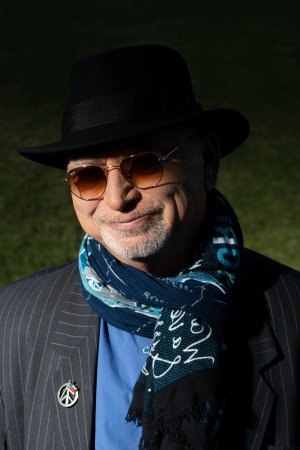 I was, I was I’m telling you. Yes, yeah it was rough. It was a rough pass, but they say the 60s are for maintenance, so you can make it through the 70s and 80s. [laughs]
I was, I was I’m telling you. Yes, yeah it was rough. It was a rough pass, but they say the 60s are for maintenance, so you can make it through the 70s and 80s. [laughs]
That’s an excellent remark, I have to bear that in mind. During that period you worked with Toto on the realisation of With a Little Help From My Friends. What was it like to perform live in an empty venue with only at most a few friends and family?
You know, it’s just we’re so used to performing that it doesn’t matter if you have five people or 5,000 people, you know, an audience is an audience. Everybody had goose-bumps and was kind of excited and eager to play. So that was a whole lot of fun to go on stage and go and play their set.
It looked like you were performing in a garage, it was a brick wall, in fact. Where was it actually? It looked like a warehouse.
It did. It was just basically that, that was downtown L.A., almost near Boyle Heights, in a warehouse. It was an abandoned warehouse.
OK, by the way, that was a great performance and good to see you back on stage.
Great to be back on stage.
Both Steve Lukather and Joseph Williams have released solo material in recent years, and the latter actually co-produces your new album. Did that influence your decision to release a solo album too?
Yes it did. Joseph had been doing solo albums for years, and so did Steve Lukather and I’ve never done one, so I wanted to remain an artist, sow my artistry on the album, so I wanted to bring some men who could help engineer. Joseph is a magnificent engineer. And he’s also a great songwriter, so I had the best of both worlds, sitting as my coach inside the booth there while I was singing or doing overdubs or playing whatever. Definitely him and Luke who urged me and prodded me in a very positive, supportive way to make my own solo record, as well as a lot of friends and people, other people out there, so I love support.
So at 68 you produce your debut album.
My debut album, I hope, that’s what my goal, my dream come true. So with winning Best New Artist or Best New Up and Coming Artist. [laughs]
That will be great, you know. And another feather in your cap.
It would be, it would be.
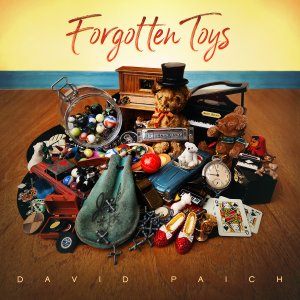 The title of your new album is Forgotten Toys. I think, if I’ve read correctly, it stems from a collection of lost gems from the past. Can you tell me what’s the oldest song and what’s the latest?
The title of your new album is Forgotten Toys. I think, if I’ve read correctly, it stems from a collection of lost gems from the past. Can you tell me what’s the oldest song and what’s the latest?
Well, I think the oldest one is the one that I started first, All the Tears That Shine. It wasn’t finished until 2014/15. Then it got finished and then I put out the guy who wrote the song with me. I put out the demo vocal with him singing on it but re-did the whole track, so that’s the oldest one.
It’s Michael Sherwood you’re talking about.
Michael Sherwood, yes. My co-writing partner who passed away this last year.
Yeah, yeah, I’m so sorry to hear that.
And yeah, but I wanted for people to hear his version of the song ’cause I think it’s very compelling and very passionate. Another older song is Lucy which is about seven years old. And that’s a song I did with Mike Lang who also by the way, just passed away. But I wanted to do a kind of homage to my dad (Marty Paich) and Mel Tormé on the album. That’s why I brought James Tormé to sing on it, it’s just to show another side of me that you don’t ever see on Toto records.
It’s one of my favourites David, as a matter of fact, that nice free flowing jazz. It’s just like a couple of guys in the corner of a room, just playing together, enjoying themselves. You know, that kind of feeling.
I’m so glad. Yeah, it’s supposed to feel like you’re in the Village Vanguard in New York or something. Some small club, you know, I’m glad if we got that across then we accomplished what we set out to do.
Well, you did it for me, you did that. By the way, we’re into the album already; Lucy. Is that a continuation of Toto’s penchant for girls names? Like Lea, Angela, Mushanga, Rosanna, Holy Anna and many more. Was it a purposeful move?
No, no it wasn’t. It was more to do with the cartoon Peanuts and Lucy, Charlie Brown and Lucy. Because my sister, whose name is not Lucy but she reminds me of Lucy, reminds me of the girl you see in the cartoon, so I wanted to name it after my sister and give her a little bit of a love there, you know.
Yeah, I’m sorry to hear she died a couple of years ago, isn’t it after some illness and you were very, very close to her, weren’t you?
Yeah, absolutely.
Well, well done on this tribute to her. You use a couple of famous friends from the musical world for the new album, amongst them of course Lukather and Williams. Who else participates on the album?
The first guy called was Mike McDonald (Doobie Brothers), who sang on Spirit of the Moonrise. He’s singing choruses and then he did some step outs at the very end. And it’s very great singing. I just love the fact he’s singing on that particular song, because it’s not quite a Mike McDonald type of song, but I love hearing him singing that.
Steve played a great solo on that, Steve Lukather did. Also on Queen Charade, I brought in the drummer who’s with Rolling Stones right now, Steve Jordan, he played on that song and I brought in an ex-Eagles member, Don Felder, to play slide guitar on it. So he’s playing slide and I love the way he plays slide guitar. I mean so all those Eagles records and stuff that he’s so famous for.
Not bad if you have a Rolodex like that at hand, David.
Yeah, and these are all friends. These are all close friends like Nathan East, Davey Johnston from Elton John’s band and Dean Parks. Who else… Gregg Bissonette from Ringo’s band. But that’s about it for right now.
Well, it suffices for me. The music is quite diverse on the new album. It’s rock to blues, you have ballads, there’s the jazz with Lucy. All these styles must appeal to you?
Yes, yeah. So I wanted to show a bit of a different side of me and the thread to me it’s me singing and playing on these songs which I don’t get a chance to sing a lot on Toto albums ’cause we have other singers that sing really good, but so I get to sing every once in a while I sing this song. With this I sing, I think, five out of the six songs… or four out of the six songs I sing on this, so it was fun and challenging because I have a very limited range. Kind of like a songwriter, pianist, singer, and so I had to tailor it to my voice my range.
You’re selling yourself short, David.
Well, thank you but, you know, I just hear great singers and that’s why I split songs up like Rosanna and Africa between me and the lead singer at the time. It’s because I say to myself: “just because I can’t sing that range. It doesn’t mean that we shouldn’t make the song”, you know.
Absolutely. There’s a couple of songs on the album that fit perfectly in the Toto concept, and I’m of course referring to, well, willibelongtoyou and especially Spirit of the Moonrise, my favourite as a matter of fact. It’s up there with the best of Toto songs, if you ask me.
Well, thank you very much, I appreciate that.
Is it also a favourite of yours, what’s your favourite song on the album?
It is, it is, I love it very much, I love all the songs that we put on that album. I’ve heard it probably over hundreds and hundreds of times and I still am not tired of it, you know, which is a good sign.
Exactly, that’s a good sign that it’s an excellent album, isn’t it? If it passes your own scrutiny.
But the real test is the public, it’s people like you that haven’t heard the record before. You know what I mean?
Yeah, that’s true. Well, they’ve heard a couple of songs you released as singles, like you did with Spirit of the Moonrise, right?
I think willIbelongtoyou is going to be the next one out, the entire album gets released on Friday. [19th August]
I really like the album. The only thing I have is that it’s relatively short, you know, barely half-an-hour. It’s more like an EP. It must be a conscious choice, it couldn’t be lack of material, could it?
Yeah, well you know I have the beginnings of other songs and stuff, but I didn’t want to have any filler tracks. I wanted them to all be strong and I can’t even listen to a whole album of my favourite artist these days, you know what I mean? Twelve songs, when you get to twelve or thirteen songs of the same singer, the same singing, the same songs. I get bored after a while, even if it’s some of my favourite singers. But the other reason I just wanted this album, these songs, I felt had a connection together and they felt like a little family together as opposed to just putting some rogue songs in there just to fill out the album.
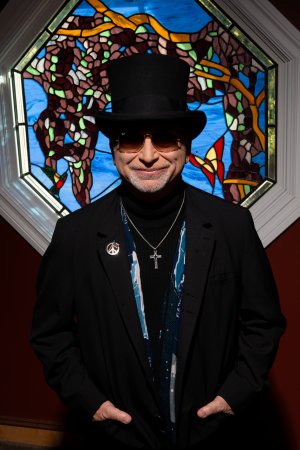 Yeah, and less is more, David. Isn’t it, these days?
Yeah, and less is more, David. Isn’t it, these days?
It certainly is, so that’s the whole truth.
And at our age we simply have to.
This is all true, at our age, so true.
OK, the album cover I really like. That’s your wife’s work isn’t? It’s a collection of items that have to do with you as a person and show a different, unknown side of you. The individual objects in there, they all have something to do with you personally? Because I saw an umpire whistle, can you explain what that’s doing on the cover?
Well, that’s my wife Lorraine, she used to be a playground coach and athletic coach, so some of her stuff is in there. Some of her odds and ends are in there. My dad’s stopwatch is in there, they used to do movies. You’ll see a harmonica in there ’cause it gets played on Queen Charade and there’s pianos, there’s a bear with a top hat.
And the toy cars, David, are you a petrolhead yourself?
Yeah, that’s my wife’s Mercedes, it’s a little two-door Mercedes. It’s the first car I bought my wife when I got married, so that’s in there. There’s ruby slippers and I will tell you all this stuff, but there’s little time. There’s a Toto watch in there. There’s all little hidden things that all have meaning, but they’re all also, I like my set of Jack’s, my set of marbles. Those are my own bag of marbles that I had when I was a kid.
So even the marbles have a specific meaning in this context.
They do. We do everything, everything is tight in and my wife, but she’s such a creative person and she has experience dealing with the camera. She’s a food stylist, so she’s used to dealing with miniatures on camera, so she arranged that whole shot right there, and I have to give her full credit for that.
Yes, you have to congratulate her on my behalf, it’s a really, really good cover as a matter of fact.
Thank you.
And are there any plans right now to perform Forgotten Toys in a live setting? What I’m actually thinking about is a trio performance of the three of you, Joseph, Steve and you and then throwing in a couple of Toto songs in the end perhaps?
Yeah, right there you go, that’s interesting. I’ll run that by the guys, sounds interesting. Sounds good actually. But I don’t have any plans right now to do any live stuff, but I’m not ruling anything out for the future.
Staying on the live side, you stopped touring with Toto, obviously due to health issues, but yet you regularly appear on stage with the band. You recently did that on the Dogz of Oz tour, even in Amsterdam a couple of weeks ago. What determines whether you are joining the guys on stage or not?
I think the location of the gig. And cities that I enjoy being in and performances that I think are going to be magical and important like the one at Ziggo Dome. I thought that was a real landmark kind of date for us to play. I know all the people from our record company came, they’re from Netherlands or Mascot Label, and also our agents from William Morris were there so it was a good place for all people to come to see Toto. And then a couple cities I visited in the United States. Those cities that I like. I’m very fond of music cities, New Orleans and Nashville were two of the cities that I flew to, as well as playing in Los Angeles. So I only played about half a dozen gigs out of those, the guys did about 40 or 50 gigs with Journey and I think they’re going to be touring with Journey again next year.
So you’re going to be picking and choosing, as you should.
Yeah, just a couple here and there, you know, selected ones.
Well done. By the way, you always been very popular in Holland. Didn’t it all start here with Alfred Lagarde [famous Dutch DJ who died in 1998] some 45 years ago?
It all started out with Big Al Lagarde, absolutely, that’s where our records broke, in Holland. But we have a special love for our fans and friends and colleagues.
You recorded three live albums in our country, that says it all. And those 15,000 people responded quite spectacularly to your performance in July at the Ziggo Dome, didn’t they?
Oh, they did, they were so great. They were singing real loud and they were just amazing, we couldn’t get a better audience.
Great to hear that. I have a couple of questions if you don’t mind about Toto, it’s a huge part of your life. Cheers, let me do the same, water these days, David. [takes a sip of water]
It’s all water these days, that’s right? [laughs]
Where have all the good times gone?
Those two times, I have a few memories from Amsterdam, that’s for sure.
Maybe, maybe another time David.
Another time, maybe another time.
Alongside the late great Jeff Porcaro you are the founder and are widely regarded as the driving force behind Toto. How do you look back on almost 50 years of Toto?
I look back on it with fondness, very proud of Toto. Their legacy, that we’ve done well how we were in high school. This was our dream come true, to be in a band and play and still be recording, sometimes for friends, we still work for friends during records. But basically we worked very hard at becoming a band as we were a band in high school of sorts and used to play high school dances and everything. So this is just we’re living the dream. We’re living the dream and we’re very blessed and very lucky to be here.
In 1982 you were only 28-years old, you co-wrote some worldwide hits and had a best-selling album with Toto IV. One year later, you had six Grammys to your name, and you found yourself on top of the world. How difficult was it to maintain, let alone surpass, that enormous success at the time?
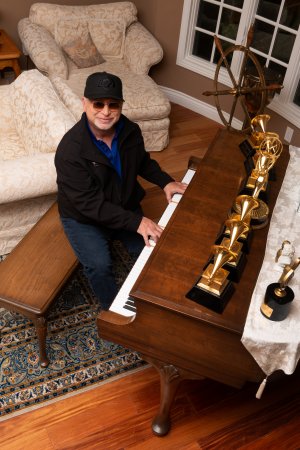 We went through a stage when we did Hydra [1979] and Turn Back [1981] where we were trying to make music for live shows so that that suits the stage alive for lighting and stuff. Because there were groups out there like Jethro Tull and Queen and groups that were really doing really dynamic music and not just singles, hit singles, pop singles. Although Queen had so many singles they were a phenomena and we were kind of influenced by bands like that. Bands like Yes, like Queen, ELP and so we started to stretch our wings out musically and get more progressive. A little more alternative during those times. But the record company all of a sudden let us know that, after three albums, they wanted another double platinum album, like the first album was. So I sat down and I said: “Listen, this next album has to be it, if we don’t have a hit album this next one we’re going to be in dire straits about our future as a band”. And so the first song I wrote, I tried to put together, was Rosanna. Because I just thought I’m going to put everything I know about hit records into one song and that was the one song.
We went through a stage when we did Hydra [1979] and Turn Back [1981] where we were trying to make music for live shows so that that suits the stage alive for lighting and stuff. Because there were groups out there like Jethro Tull and Queen and groups that were really doing really dynamic music and not just singles, hit singles, pop singles. Although Queen had so many singles they were a phenomena and we were kind of influenced by bands like that. Bands like Yes, like Queen, ELP and so we started to stretch our wings out musically and get more progressive. A little more alternative during those times. But the record company all of a sudden let us know that, after three albums, they wanted another double platinum album, like the first album was. So I sat down and I said: “Listen, this next album has to be it, if we don’t have a hit album this next one we’re going to be in dire straits about our future as a band”. And so the first song I wrote, I tried to put together, was Rosanna. Because I just thought I’m going to put everything I know about hit records into one song and that was the one song.
And it all started from there, basically in terms of the success, hasn’t it? By the way, I really like Hydra, it’s one of my favourite albums you know. It’s one of the most progressive rock albums that you guys played on. I wouldn’t say I was upset with Turn Back, but Hydra did it for me, it was already back in ’79, David, quite a while ago, but still an excellent album.
I’m so glad, we like that too. A lot of us like that too. I thought Hydra was a very good album. What Toto doesn’t like to do is repeat, cloning albums, like trying to make Toto I again. You know what I mean? I would want to depart from that and show how to expand ourselves and again, like I said, we tested the water playing live out there. You had to get much more dramatic and much more content, interesting content into your songs and not just write singles and that’s what Hydra is all about.
OK, we already mentioned the famous Rolodex of David Paich. The people you work(ed) with is some sort of a ‘Who’s Who’ in popular music. If I were to ask you, and this this question must have been asked several times before, about the most memorable experience in terms of artists, who would be on top of that list, and why?
I couldn’t answer this question without mentioning Paul McCartney and Michael Jackson, that’s about as top as you can get, that’s rarefied air. But you know, Paul McCartney is probably the greatest songwriter that ever lived. When you count all the hits and all the records he’s made. And Michael Jackson again, one of the biggest, largest talents that I’ve ever come across. So together with Quincy Jones in the room, you put George Martin in the room, my two favourite producers. It really becomes very easy, much easier because you have everybody who should be involved in the musical conversation. They’re all connected, like connecting the fabric of the music.
Were you pinching yourself while you were producing those guys?
I was actually doing the arrangements, but I had to pinch myself and it was. I went into a brain fog, because it was like: “my God, Paul McCartney”, especially Paul McCartney. And Linda was there taking pictures all the time and to see George Martin whom I know, I had worked with George Martin before, but never McCartney. McCartney was so nice and cool, it was fun. Incredible experience, one I’ll never forget.
Yeah, well maybe one day they’ll say if I ask them: “what is your best experience?” They might say, “well, that was the time when David Paich produced me”.
I’d be surprised if they said that. And by the way, I never produced him. I just arranged them.
Oh, you just arranged? You’re too modest, David.
Yeah, George Martin and Quincy were the producers.
Oh yeah, you’re right, of course. Different topic: Steve Lukather wrote quite an entertaining biography with a little help from a professional author. Is that something you’d pursue yourself?
Not really, my life isn’t an open book like that. I like to share stories with people like you and stuff, little anecdotes here and there. But as far as telling my life’s story, I don’t think anybody, first of all, is that interested, but it would be to me and my family, we would all love it, stuff like that. But I don’t really have aspirations of coming up with an autobiography.
There’s not going to be a book on David Paich: The day I worked with Michael and Paul?
I don’t think so. That’s right, maybe a very thin book of my better and best experiences.
Well, we said it before: less is more these days.
Less is more, absolutely.
OK, on a more serious side. We already discussed a vast number of friends, musical friends of yours or family that didn’t make it to today as we did. The Porcaros, for instance, but also Michael Sherwood, we just mentioned. That must have had quite an impact on you. Also your own health issues.
It did, because all of sudden we started realising we weren’t invincible and we weren’t immortal. When all of a sudden you get to 55 and 60 you go: “I can’t bounce back like I used to”, and all your fast living in rock ‘n’ roll just takes its toll on people. I mean, we lost so many great people, people like Ed Van Halen, who was Steve Lukather’s best friend. People like Miguel Ferrer [American actor, died 2017], friends of ours. Still today, we’re losing Tom Petty, Glenn Frey, all people like that, we’ve worked with before.
It may take us a step back and everybody look at themselves in the mirror and self-examine themselves and say: “we have to take care of our health”; without our health we are nothing. We cannot keep going on here if we don’t have our health, so everybody’s kind of done a little self-examination and everybody got there. Got a lot more of their shit together now than we had when we were younger, excuse the expression.
Wisdom comes with age.
I’m telling you, if we knew then what we know now.
Wise words, David, this is probably a suitable ending to our interview. All I can ask now is something trivial which I don’t want to do. I want to thank you very much. I think I’ve used up most of my time right now. I want to thank you very much for answering my questions. It was an honour and a pleasure.
Oh, the honour was mine, pleasure, and you’re one of the best interviewers I’ve had, so I hope you get to do it again. And I just want to say thank you to all our friends, fans and family in the Netherlands. We have so much gratitude, we’re so grateful for your support all these years, we wouldn’t be anything without our fans from the Netherlands, so thank you very much. God bless you.
Thank you very much. I’ll convey your wishes, please stay healthy, stay safe.
I will, absolutely.
Bye bye, thanks very much.
And you can read Alex’s review of David Paich’s Forgotten Toys album HERE.
LINKS
David Paich – Facebook

